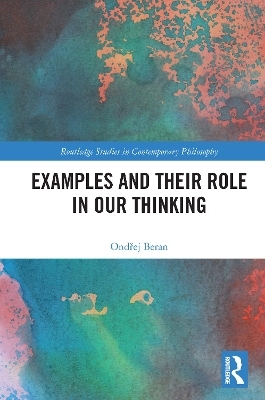
Examples and Their Role in Our Thinking
Seiten
2023
Routledge (Verlag)
978-0-367-68719-9 (ISBN)
Routledge (Verlag)
978-0-367-68719-9 (ISBN)
This book investigates the role of examples in shaping arguments and thought, both in philosophy and in everyday life. It addresses how our moral thinking is informed by our conceptual practices, especially in ways related to ethics and literature, post-Wittgensteinian ethics, or meta-philosophical concerns about philosophical writing.
This book investigates the role and significance that examples play in shaping arguments and thought, both in philosophy and in everyday life. It addresses questions about how our moral thinking is informed by our conceptual practices, especially in ways related to the relationship between ethics and literature, post-Wittgensteinian ethics, or meta-philosophical concerns about the style of philosophical writing.
Written in an accessible and non-technical style, the book uses examples from real-life events or pieces of well-known fictional stories to introduce its discussions. In doing so, it demonstrates the complex way examples, rather than exemplifying philosophical points, inform and condition how we approach the points for which we want to argue. The author shows how examples guide or block our understanding in certain directions, how they do this by stressing morally relevant aspects or dimensions of the terms, and how the sense of moral seriousness allows us to learn from examples. The final chapter explores whether these kinds of engagement with examples can be understood as "thinking primarily through examples."
Examples and Their Role in Our Thinking will be of interest to scholars and graduate students working in ethics and moral philosophy, philosophy of language, and philosophy of literature.
This book investigates the role and significance that examples play in shaping arguments and thought, both in philosophy and in everyday life. It addresses questions about how our moral thinking is informed by our conceptual practices, especially in ways related to the relationship between ethics and literature, post-Wittgensteinian ethics, or meta-philosophical concerns about the style of philosophical writing.
Written in an accessible and non-technical style, the book uses examples from real-life events or pieces of well-known fictional stories to introduce its discussions. In doing so, it demonstrates the complex way examples, rather than exemplifying philosophical points, inform and condition how we approach the points for which we want to argue. The author shows how examples guide or block our understanding in certain directions, how they do this by stressing morally relevant aspects or dimensions of the terms, and how the sense of moral seriousness allows us to learn from examples. The final chapter explores whether these kinds of engagement with examples can be understood as "thinking primarily through examples."
Examples and Their Role in Our Thinking will be of interest to scholars and graduate students working in ethics and moral philosophy, philosophy of language, and philosophy of literature.
Ondřej Beran is a researcher at the Centre for Ethics as Study in Human Value (University of Pardubice). His recent publications include Living with Rules (2018) and From Rules to Meanings (Routledge 2018, co-edited with V. Kolman and L. Koreň).
1. Introduction: Why Examples
2. Examples and Understanding
3. The Moral Bearing of Examples
4. Examples and Learning
5. Conclusion: Thinking Through Examples?
| Erscheinungsdatum | 20.07.2023 |
|---|---|
| Reihe/Serie | Routledge Studies in Contemporary Philosophy |
| Zusatzinfo | 8 Halftones, black and white |
| Verlagsort | London |
| Sprache | englisch |
| Maße | 152 x 229 mm |
| Gewicht | 303 g |
| Themenwelt | Geisteswissenschaften ► Philosophie ► Ethik |
| Geisteswissenschaften ► Philosophie ► Philosophie der Neuzeit | |
| Geisteswissenschaften ► Philosophie ► Sprachphilosophie | |
| Geisteswissenschaften ► Sprach- / Literaturwissenschaft ► Anglistik / Amerikanistik | |
| Geisteswissenschaften ► Sprach- / Literaturwissenschaft ► Literaturwissenschaft | |
| ISBN-10 | 0-367-68719-4 / 0367687194 |
| ISBN-13 | 978-0-367-68719-9 / 9780367687199 |
| Zustand | Neuware |
| Informationen gemäß Produktsicherheitsverordnung (GPSR) | |
| Haben Sie eine Frage zum Produkt? |
Mehr entdecken
aus dem Bereich
aus dem Bereich


